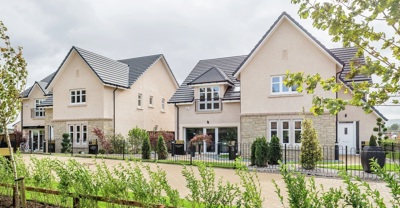According to research from Rightmove, searches for north and north-east facing gardens increased by 335% last year.
So, we wanted to highlight how you can make the most of your garden and achieve the maximum amount of sunlight in your new Cala home garden no matter the direction.
David McGuffie, of DS McG Ltd, Landscaper for Cala homes in the West of Scotland, shares his expertise of the benefits North-facing gardens can bring.
"Many prefer south-facing gardens as they tend to get more sunlight. But depending on the size of your garden and the surrounding environment, there will likely be a mix of sun and shade throughout the day regardless of what direction your garden faces, and having a north or north-east facing garden also brings many benefits too."
The attraction of each type of garden completely depends on your preference.

Sun and shade
North-facing gardens have the benefit of getting light in the afternoon and evenings, which is ideal for most, as this is when you’re likely to enjoy your outdoor space, especially if you’re working during the day. There tends to be a reliable evening sun in north-facing gardens from May to October.
When it comes to arranging your patio furniture, most people think that having it at the top of your garden, beside your doors, is the best place for it. However, this isn’t always the case. Since the sun is most likely to be around in the afternoon and evening, it’s best to put your outdoor furniture at the bottom of your garden so you can catch some rays and enjoy those golden hours in style.
Blooming flowers and plants for north facing gardens
Flowers and plants are not only lovely to look at, they also benefit the environment, so make sure you leave space for some greenery. The biggest benefit is that not all plants need constant sunlight, which is perfect for a north or north-east facing garden. There are plenty of plants that will thrive and bring some colour to your garden from spring right through to autumn.
To brighten up your garden, using a mix of ferns, ornamental grasses, and hostas as these types of plants don’t require a lot of sunlight but will still be striking in the summer. Hydrangeas, and in particular climbing hydrangeas, are the ideal flower for the rear wall of a shaded home, providing beautiful white flowers in late summer to autumn.

Planting
Planting up a north or east facing border may have its challenges, however correct preparation of the ground and mindfully chosen species selection should ensure a successful end result, providing stem, foliage and flower interest throughout the seasons.
It is fair to say that ground conditions play a significant role in a successful garden. It is advisable to ensure that before planting commences there is a minimum of 200mm of good loamy humus rich topsoil in place with adequate drainage so it is not sitting saturated at any time of year. A little effort may be required to achieve this as often beds can be neglected and generally in poor shape.
Once all grass, weeds and general debris has been removed, the beds can be dug over and depending on their condition, extra good top soil added or at the very least good quality peat free compost in abundance.
New beds look far better and show off the plants in a far better light if raised 100mm or so above any lawn or hard surfaced areas.

Temperatures
As north facing gardens can have areas in the shade for some of the day it means that the house itself will block out the sun. This ensures that there is always a consistent temperature and the bonus of rear rooms staying cool in the summer, a necessity especially during heatwaves. Another benefit of a lower temperature is your garden furniture will be protected from the glare of the sun so think fewer bleaching effects on coloured fabrics, saving you from having to buy replacements.

Tag us in your garden photos on Instagram @calahomes if you take on any of these tips.
Find out more about our homes for sale in Scotland and England.





